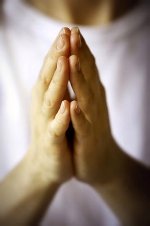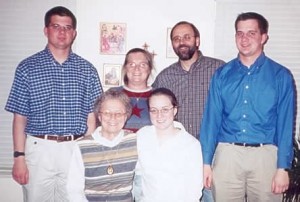The church has always been the center of the life that Carolyn and I have lived. We were both raised in nominally Christian homes but rejected the church in our teen years…
by The Hansen Family
 After flirting with godlessness, we both became Christian in our 20’s at one of Seattle’s growing mega-churches. We met at a single’s bible study, married a year later, had our first child a year after that and then headed out for Bible College.
After flirting with godlessness, we both became Christian in our 20’s at one of Seattle’s growing mega-churches. We met at a single’s bible study, married a year later, had our first child a year after that and then headed out for Bible College.
We spent the next ten years headed toward and living on the mission field. I completed Bible College while Carolyn raised kids. I pastored a small church and then served on the staff of several large and growing churches. After five years of preparation and fund raising, we moved to Istanbul, Turkey where we learned the language and did further preparation for our final target—Tashkent, Uzbekistan. Tashkent is the key to Central Asia and the capital city of the Uzbek people. As Tashkent went, so would go much of the 50 million unevangelized Muslims of Central Asia.
We arrived in Tashkent one year after the Berlin wall fell, just as the Soviet Union was breaking up. We were among the very first western missionaries to live in Tashkent in almost 100 years.
Carolyn’s health deteriorated in Tashkent and we eventually moved back to the States. Someone gave me a book to read on the long flight home—Becoming Orthodox by Peter Gillquist. On the face of it, the book seemed a crazy story. A bunch of Campus Crusade families had become Eastern Orthodox as a result of studying church history. Much of Gillquist’s persuasion left me cold, but one thing stuck.
 Gillquist challenged his readers to read the accounts of the early church fathers and compare the church they found there with the church in which they worshipped on Sunday morning. He said that an honest reader would find the church of the martyrs much more like an Eastern Orthodox Church and very much not like an American Evangelical church.
Gillquist challenged his readers to read the accounts of the early church fathers and compare the church they found there with the church in which they worshipped on Sunday morning. He said that an honest reader would find the church of the martyrs much more like an Eastern Orthodox Church and very much not like an American Evangelical church.
I took him up on the challenge.
Of course, Gillquist turned out to be right. During its first 300 years, the church turned out thousands of martyrs, conquered the Roman Empire from within and wrote extensively about her beliefs and practices. It is a church whose doctrines are confirmed by her history and made unassailable by her martyrs.
How can a comfortable twentieth century Christian tell a third century martyr that his way of doing church is wrong? And the way the Christians did church in the age of the martyrs was distinctly Eastern Orthodox. These Christians had authoritative, hierarchal church organizations.
They worshipped in a liturgical way and they were willing to give their lives for the real, sacramental presence of the body and blood of Christ in the Eucharist.
The Eastern Orthodox Church claimed to be that same church of the martyrs, only grown and matured by the passage of time. In the same way that I am my parents’ baby boy grown to manhood, the Eastern Church claimed to be the church born of the Apostles, nurtured by the martyrs, trained by the ecumenical councils and grown to maturity by years of perseverance.
I was fascinated and horrified both. If I really had stumbled onto the church as given to us by the Apostles, that would be an amazing gift from a merciful God. On the other hand, if the Orthodox Church was what it claimed to be, that would mean a tectonic shift in our life and family. I loved being a missionary. The church was the center of our family—it was the rock upon which our marriage was built.
If the Orthodox were right, we would have to change everything that mattered in our lives: faith, church, marriage, family, friendships and career.
The summary is that through a yearlong struggle, we managed to do just that. At times, Carolyn was sure that our marriage and family were going to break up. At times, we were all put off by the sheer Catholic-ness of the Orthodox Church. (If there is a foundational principal of popular Evangelical theology, it is that all things Catholic are wrong.) We had a tough time coming to grips with Mary. It took us a long time to appreciate the liturgy.
Confession was terrifying and exhilarating. In addition to questions of faith and family, I had to find a new line of work.
Ten years after the fact, our family is solidly Orthodox. The kids were part of the journey and choosing to become Orthodox is a significant chapter in their growth from childhood to adolescence. Carolyn and I are growing in the love of our youth. Carolyn is missing a lobe of her lung—the sickness that brought us back from Tashkent turned out to be lung cancer—but the doctors say all the cancer is removed. As it has been for our entire married life, the church is very much the center of our life.
One last thing needs to be said. Many of our old Evangelical friends have great difficulty understanding our move to the Orthodox Church. They see the change as a rejection of the church that sent us to Tashkent and the friendships and prayers that sustained us there. That reaction is understandable but it is very different from our own view. We think of ourselves as having been given a chance to move from good to better. The Evangelical church is certainly a means of God’s grace.
But our conclusion is that the Orthodox Church is more so. We do not think of ourselves as having moved away from the church so much as having moved to her core. If the cross of Christ is surrounded by concentric circles, then we have moved from a good circle to a better, and even closer circle. It makes sense that our change is hard to understand, but we very much appreciate the many Evangelical Christians that nurtured and prayed for us for many years.
To all of you we say “Thank You” and invite you to take a closer look at historical Christianity in the Eastern Orthodox tradition.

Leave a Reply